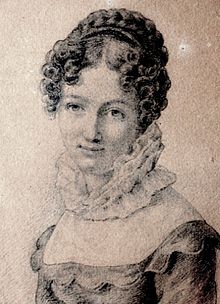Benjamin Wegner
Jacob Benjamin Wegner (born February 21, 1795 in Königsberg , East Prussia , † May 22, 1864 in Christiania , Norway ) was a Norwegian industrialist , landowner and timber merchant of German origin. He was also the Hanseatic and Portuguese consul general in Norway.
His wife Henriette Seyler was the daughter of the Hamburg banker LE Seyler and Anna Henriette Goßler and granddaughter of the theater principal Abel Seyler .
Life
Early life
Jacob Benjamin Wegner grew up in Königsberg and was the son of the royal police commissair Johann Jacob Wegner (approx. 1757–1797) and Regina Dorothea Harder (1770–1813). His mother was married to the shipbuilder Philipp Gutzeit in 1798. He had a brother, Friedrich Salomon Wegner, and several half-siblings.
After a commercial apprenticeship in Königsberg, he moved to Berlin around 1820 and worked as an independent broker in the Baltic-British timber and grain wholesale trade, with frequent stays in London . He developed a close collaboration with the English trading house Isaac Solly and Sons . He was also a friend and agent of the English art collector Edward Solly ; Through his mediation, Solly's painting collection of over 3,000 pictures was transferred to the Prussian King Friedrich Wilhelm III in 1821 . (which they donated as the foundation of the Berlin Royal Museums) sold for a sum of 500,000 Reichstalers.
Industrialist in Norway

In 1822 he bought the Modum blue color factory in Norway on behalf of the banker Wilhelm Christian Benecke and himself. In the same year he moved to Norway and headed the blue color factory until 1849 as general director and one of the two owners. The plant was the largest industrial company in Norway. Wegner not only increased sales, but also introduced comprehensive socio-political reforms to the benefit of the workers, so that he is considered the ancestor of the Norwegian welfare state .
In 1836 he bought the Frogner estate (with Frognerseteren and today's Frognerpark ) in Aker near Christiania, where he lived until 1849. He was also one of the two owners of the Hassel ironworks (50%) and eventually became the largest co-owner of Hafslund Gut , with large forest holdings and sawmills in Norway. In 1856, he and Iver Albert Juel founded the timber company Juel, Wegner & Co. based on their shares in Sarpsfossen .
He was consul general of the Hanseatic cities of Hamburg (where his in-laws sat in the Senate), Lübeck and Bremen as well as the Kingdom of Portugal in Norway.
He had good language skills and spoke at least German, English, French and Norwegian.
family
He was married to Henriette Seyler (1805-1875) on May 15, 1824 in the Hamburg main church St. Nikolai . She was the daughter of the Hamburg banker LE Seyler (boss and co-owner of Berenberg Bank ) and Anna Henriette Goßler , and granddaughter of the banker Johann Hinrich Gossler and Elisabeth Berenberg , as well as the theater director Abel Seyler . Henriette Seyler was u. a. a cousin of Hamburg's First Mayor Hermann Goßler .
His children, all born in Norway, were married to members of various prominent families in Norway (le Normand de Bretteville, Vibe, Paus and Nørregaard). His son Johann Ludwig Wegner (* 1830) was a judge in Norway and married to Blanca Bretteville, daughter of the Norwegian Prime Minister Christian Zetlitz Bretteville , and was the father-in-law of the President of the Supreme Court Karenus Kristofer Thinn . His second son Heinrich Benjamin Wegner (* 1833) was a timber merchant and the youngest son George Wegner (* 1847) was a lawyer at the Supreme Court. Benjamin Wegner was the grandfather of the internationally known war correspondent and Minister of Labor in the Provisional Government in China Benjamin Wegner Nørregaard , the President of the Norwegian Red Cross Nikolai Nissen Paus , the Director of the Norwegian Employers' Association George Wegner Paus, the President of the Norwegian Bar Association Harald Nørregaard and the wine merchant Consul in Tarragona Ludvig Paul Rudolf Nørregaard. His descendants live u. a. in Norway and Spain. He is considered to be the progenitor of the Norwegian Wegner family, which has several prominent members.
literature
- Rolf B. Wegner: Wegner families . Oslo 1967.
- Tone Sinding Steinsvik: The cobalt mines and the royal blue from Norway - part of the big world . Modum / Norway 2000. ISBN 82-90734-23-9 .
- Lars Roede: Industrialists Benjamin Wegner på Frogner , in Lars Roede. Frogner hovedgård: Bondegård, herskapsgård, byens gård (pp. 148–161), Pax forlag 2012, ISBN 9788253034966
- " Benjamin Wegner ." In: Store norske leksikon .
| personal data | |
|---|---|
| SURNAME | Wegner, Benjamin |
| ALTERNATIVE NAMES | Wegner, Jacob Benjamin (full name) |
| BRIEF DESCRIPTION | Norwegian industrialist and landowner of German origin |
| DATE OF BIRTH | February 21, 1795 |
| PLACE OF BIRTH | Koenigsberg , East Prussia |
| DATE OF DEATH | May 22, 1864 |
| Place of death | Christiania , Norway |



